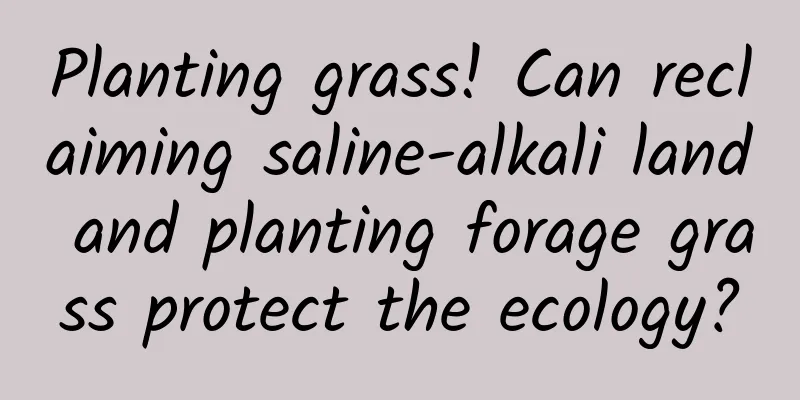Planting grass! Can reclaiming saline-alkali land and planting forage grass protect the ecology?

|
Salinization is known as a stubborn disease of the land. Due to its high mineralization and poor irrigation conditions, it can easily lead to low or even zero crop yields. However, in saline-alkali land, which was originally barren, alfalfa, a tenacious plant, can turn poverty into treasure, showing great economic, ecological and social value. Recently, at a training course on "High-efficiency Cultivation Technology of High-quality Alfalfa" was held in Tianzhen County, Datong City, Shanxi Province. Alfalfa seeders, harvesters, picking and baling machines, silage wrapping machines and other practical production and harvesting machinery were demonstrated on site, and technical experts explained in detail the performance, operating requirements, characteristics and advantages of the machinery. The Datong Basin, located in northern Shanxi Province, is the northern boundary of my country's northern agricultural and pastoral transition zone and the lower limit of rain-fed agriculture. It is a typical ecologically fragile area. The area of soda-type saline-alkali land in this region accounts for a large proportion and has a high soda content, but the land resources are rich and the development potential is great. It is a priority area for agricultural and animal husbandry development. Relevant survey data show that with the overall decline in groundwater levels, the degree of soil salinity in the Datong Basin has decreased, but there are still 132,500 hectares of soda-type saline-alkali land. This part of the soil has low nutrient content, poor water and moisture retention capacity, and low productivity, which seriously affects the sustainable development of agricultural production and grassland and animal husbandry in the region. The biggest advantages of alfalfa are its cold and drought resistance and strong adaptability. Due to its well-developed root system, alfalfa can effectively fix nitrogen, phosphorus and other elements in the soil, increase the content of soil organic matter, improve soil structure and increase soil fertility. This is crucial for saline-alkali land. Alfalfa, formerly known as purple clover, is a treasure from head to toe. Planting alfalfa can significantly reduce the salt content in the soil. On the one hand, the root system of alfalfa can absorb and remove the salt in the soil; on the other hand, the mulch of alfalfa can reduce the evaporation of surface water, thereby reducing the salt content in the soil. At the same time, alfalfa has a well-developed root system and grows rapidly, which can firmly fix the soil, reduce the erosion of rainwater, and effectively prevent soil erosion. In addition, the dense stems and leaves of alfalfa can effectively prevent wind erosion of the soil and improve the local climate. The reason is that the stems and leaves absorb and store a large amount of water, which improves the utilization rate of surface water. Its transpiration can increase air humidity, reduce local temperature, and improve the local microclimate. As a high-quality feed crop, alfalfa has high nutritional value and is widely used in the animal husbandry industry. A large number of livestock, such as cattle, sheep, and pigs, like to eat alfalfa, which can not only increase their weight but also increase milk production. Therefore, the demand for alfalfa in the feed market continues to grow, and it is a good way to help people increase their income. In addition, alfalfa is also used to make tea and extract alkaloids. Alfalfa tea has the effects of clearing away heat and detoxifying, calming the mind and nourishing the heart, moistening the intestines and relieving constipation, and is deeply loved by consumers. The extracted alkaloids have high medicinal value. These have opened up new income channels for farmers. Alfalfa also plays a positive role in the sustainable development of agriculture. Through scientific planting and rational use of resources, alfalfa not only improves land productivity, but also helps reduce the use of fertilizers and pesticides, protects the ecological environment, and improves the quality of agricultural products. It can be seen that alfalfa, a special plant resource, not only improves the ecological environment, but also helps local farmers get rid of poverty and become rich. We look forward to the "wealth-making grass" blooming more brilliantly in saline-alkali land in the future. (The author is an associate researcher at the Institute of Alpine Crops, Shanxi Agricultural University) |
>>: Which crow is black? Correct answer: None of them
Recommend
Is it really dangerous to exercise after staying up late?
Fitness is undoubtedly a good habit. Drink a cup ...
Can Chinese medicine raw licorice be soaked in water and drunk?
Licorice soaked in water has good therapeutic eff...
Is it easier to gain weight in summer? 8 ways to stay away from fat
A woman called me and asked me: Other people gain...
Bacteria are so "fertile", will the earth be occupied by them one day?
Produced by: Science Popularization China Author:...
Gray hair at a young age? These habits and nutrient deficiencies are accelerating the formation of gray hair
Reviewer of this article: Zhou Xiaobo, Doctor of ...
Many diseases can be traced back to bad habits in your life! Check yourself!
"Doctor, how did I get this disease? I'm...
The efficacy and function of Physalis root
As a traditional Chinese medicine, do you know th...
The efficacy and function of Cissus pubescens
Cissus pubescens is a very common Chinese medicin...
A herbal medicine for kidney disease
For men, hearing that they have kidney disease wi...
The efficacy and function of Qingtongcao
Many people are not very clear about Qingtongcao,...
The efficacy and function of old white flower bark
The bark of the old white flower tree is a very c...
The efficacy and function of Ganoderma lucidum
Only when we understand the main ingredients of a...
43 years after the eradication of smallpox, why haven’t we eliminated more infectious diseases?
Smallpox as a highly contagious disease The morta...
The efficacy and function of beef bones
What are the functions of beef bones? As a tradit...









